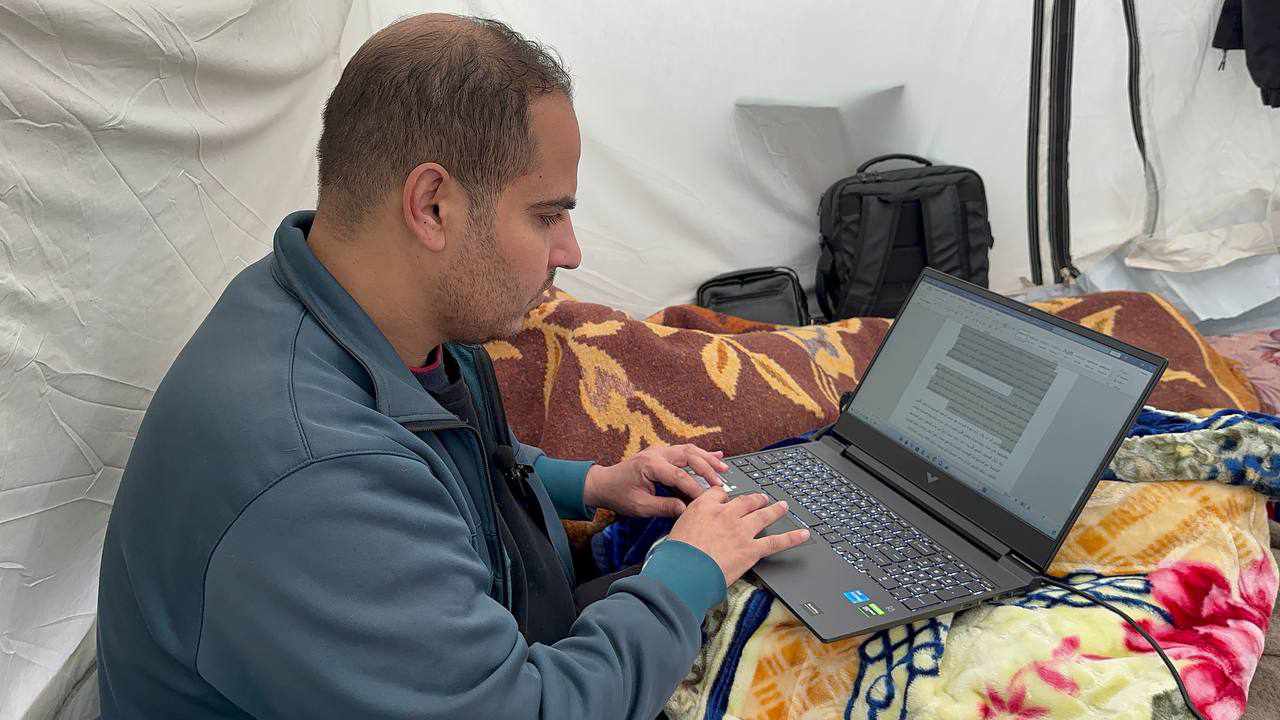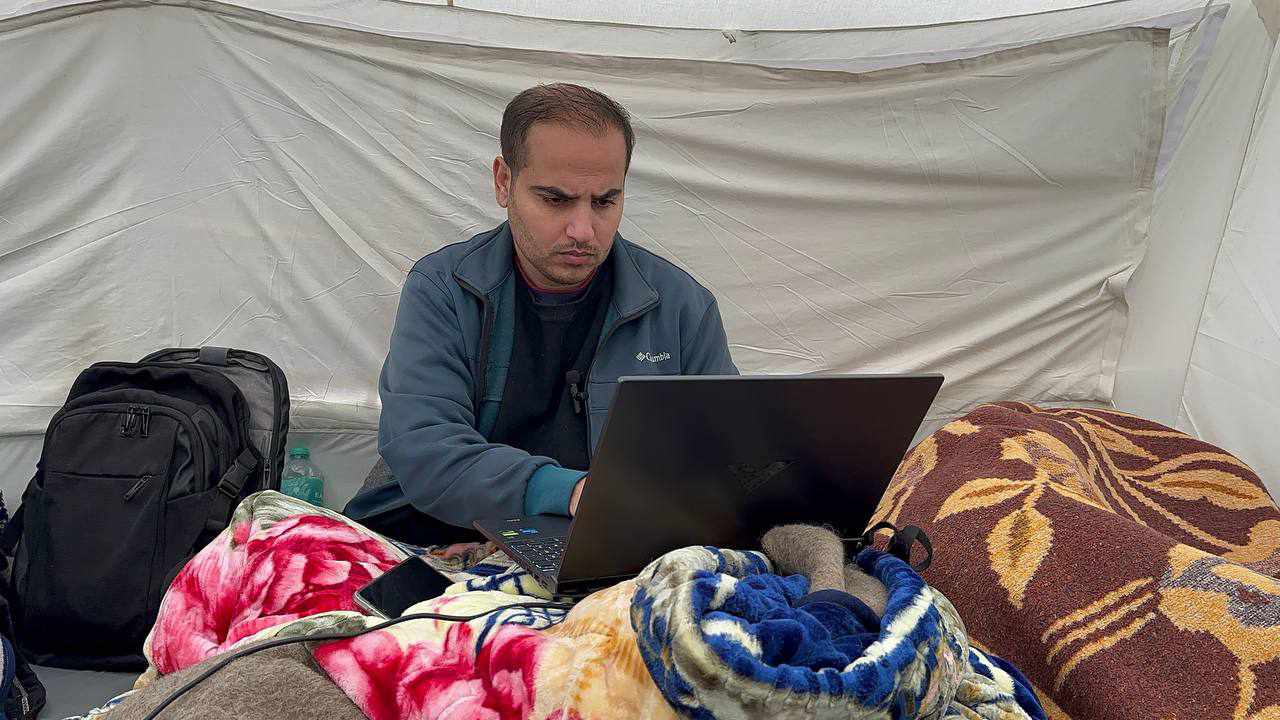عندما بدأت حرب الإبادة والتدمير والتجويع في قطاع غزة ما بعد السابع من أكتوبر 2023، لم يكن أحد يتوقع أن نصل إلى هذا الكم من الجرائم الإسرائيلية والشهداء والدمار والتشريد والوجع، وفقدان أدوات العمل الصحفي واستهداف الصحفيين بشكل متعمد وعلني ومن دون أدنى مراجعة أو محاسبة للمحتل.
بصفتي صحفيا بدأت العمل سنة 2004 واعتدت تغطية الحروب والاعتداءات الإسرائيلية على قطاع غزة، هيأت لنفسي الظروف في منزلي لأتمكن من العمل والتغطية بشكل أقل صعوبة، لكني فقدت كل ما جهزته في اليوم الثاني من حرب الإبادة عندما غادرت منزلي مجبرا.
في بيتي في حيّ الكرامة إلى الشمال الغربي من مدينة غزة جهزت نظاما كهربائيا يعمل بالطاقة الشمسية وخطَّيْ إنترنت فائقَيِ السرعة من مصدرين مختلفين ومكتبا وأدوات أخرى تساعدني على إكمال عملي بالشكل المُرضي. بيد أن كل ذلك أصبح بلا قيمة عندما أغار الطيران الحربي الإسرائيلي بصاروخ واحد على أرض زراعية بجوار منزلي ووصلتني مع الجيران عشرات الاتصالات الهاتفية والتهديدات من جيش الاحتلال الإسرائيلي لإخلاء المنطقة بالكامل.
هكذا كنت أعمل بجد لنقل الصورة الحقيقية لما يجري، لكنني فجأة ومن دون مقدمات كثيرة أصبحت أنا الخبر بعد أن كنت ناقله.
أخليت منزلي متجها نحو منزل والدي وأشقائي في مشروع بيت لاهيا شمالي القطاع، وبدأت العمل من هناك على التغطية اليومية واللحظية للأحداث واستلام مواد الصحفيين المتعاونين ونقلها إلى أقسام موقع وصحيفة "العربي الجديد" والترتيب مع الزملاء وتقاسم المهام معهم. لكن في اليوم الخامس من الحرب تغير كل شيء مرة أخرى؛ انقطعت الاتصالات الهاتفية تماما ولم أتمكن من معرفة ما جرى مع الزملاء المتعاونين، ولا التواصل معهم، بل أصبح الحصول على الإنترنت ضربا من الخيال ولم يعد هناك أي مصدر كهربائي في المنزل لشحن الهاتف والحاسوب، وغدت التغطية مستحيلة في هذه الظروف.
فهمت حينئذ أن الاحتلال يريد منا الاستسلام للأمر الواقع، وأن يستمر في قتل الفلسطينيين وتشريدهم وقصف المنازل على مَن فيها وتغييب الشهود. لكني لم أستسلم لهذا الواقع، ومن هنا بدأت -وبدأ كثير من الصحفيين- رحلة البحث عن خيارات وأدوات ممكنة لتجاوز العراقيل التي صنعتها إسرائيل أمام الصحفيين في غزة.
بعد يومين من البحث وجدت شخصا يبيع شرائح إنترنت إسرائيلية بأضعاف سعرها الحقيقي، وبجودة أقل من المتوقع؛ فاشتريت واحدة وبدأت أبلغ الزملاء الصحفيين بطريقة الشراء والتشغيل وضمان التقاط أفضل إشارة. وهكذا تغلبنا على المشكلة الأولى، واتخذت قرارا بالعمل من الهاتف لسهولة شحنه وترك الحاسوب لصعوبة نقله من مكان إلى آخر. كنت في تلك اللحظة أُشغل أطفالي وأبناء إخوتي لنقل هاتفي والشاحن البديل (باور بنك) من مكان إلى آخر في الشارع لشحنهما عبر أنظمة طاقة صغيرة لديهم، وقد تعاون الجميع معي وساعدوني من أجل أن تظل التغطية مستمرة، لكن مع الأيام أصبح شحن الهاتف أيضا ضربا من المستحيل نتيجة شدة القصف والاستهداف المباشر والخوف من التنقل في الشوارع نهارا نتيجة الطائرات المسيرة التي تستهدف كل المتحركين، والتي كنا نسميها "كواد كابتر".
بدأ جنود الاحتلال التعامل بوحشية مع الشبان المعتقلين، وحتى الصغار وكبار السن، وبينما كنت أقول لأحدهم إنني صحفي ومدني ولا علاقة لي ولا لكل المعتقلين بالفصائل الفلسطينية، كسر بطاقتي الصحفية بيديه!
استفدت من شريحة الإنترنت الإسرائيلية أكثر من غيري لقرب منزل والدي نسبيا من الحدود مع فلسطين المحتلة، حيث عشرات الهوائيات لشركات الاتصالات والإنترنت. ثم استرجعت القدرة على التغطية والمتابعة، لكن مشكلة التواصل مع الزملاء المتعاونين ومصادر الأخبار لا تزال "متفاقمة"، وتزداد صعوبة يوما بعد يوم.

لم تكن التغطية في هذه الفترة سهلة، ولا مكتملة، وأقر بأن أحدا في غزة لم يستطع إيصال الصورة كاملة؛ نتيجة القوة المفرطة التي استُخدِمت بحق المدنيين والصحفيين وخطورة التنقل وغياب المعلومات في كثير من الأحيان وسرعة الأحداث وتلاحقها غير المعتاد.
هكذا كنت أعمل بجد لنقل الصورة الحقيقية لما يجري، لكنني فجأة ومن دون مقدمات كثيرة أصبحت أنا الخبر بعد أن كنت ناقله. استيقظنا الساعة الخامسة فجر يوم الخميس 7 ديسمبر/ كانون الأول 2023 على أصوات تجريف ودبابات إسرائيلية بالقرب من منزل والدي، وبعد ذلك بساعتين بدأنا نسمع أصوات الجنود الإسرائيليين يطالبوننا والجيران بالخروج من المنزل وتسليم أنفسنا، في مشهد لم نتخيله من قبل.
بدأ جنود الاحتلال التعامل بوحشية مع الشبان المعتقلين، وحتى الصغار وكبار السن، وبينما كنت أقول لأحدهم إنني صحفي ومدني ولا علاقة لي ولا لكل المعتقلين بالفصائل الفلسطينية، كسر بطاقتي الصحفية بيديه! فهمت حينئذ أن الأمر لن يكون سهلا وأن أمامنا رحلة صعبة وقاسية قد لا تنتهي بسهولة، وقد أُعاقَب على عملي الصحفي أكثر من غيري من المعتقلين.
مساء السابع من ديسمبر/ كانون الأول أجري أول تحقيق معي في قاعدة زيكيم العسكرية شمال غرب قطاع غزة بعد ساعات من الإهانة والإذلال وإجبارنا على خلع ملابسنا باستثناء الداخلية منها. في البدء تركز التحقيق على علاقتي بالفصائل، وعندما تأكد المحقق أنني صحفي شرع في توجيه الإساءات والشتائم لي، وسألني عن عملي وعن تقرير أنجزته سنة 2018 عن وحدة "سييرت متكال" التي تصدت المقاومة لها شرقي خان يونس وأوقعتها بين قتيل وجريح، وهو تقرير منشور في "العربي الجديد". كان الضابط المحقق مستاءً من بعض المعلومات في التحقيق لتغيير طريقة تعامله معي بالإمعان في الإساءة والضرب وأنا مقيد اليدين إلى الخلف وأرتدي عصابة على العينين. وقبل نقلي إلى موقع عسكري آخر وضع لاصقا على فمي لأني كنت أجادل الجنود وأتحدث إليهم عن خطأ اعتقالنا نحن المدنيين وأنني صحفي لا أنتمي لأي من الفصائل.
أجري أول تحقيق معي في قاعدة زيكيم العسكرية شمال غرب قطاع غزة بعد ساعات من الإهانة والإذلال وإجبارنا على خلع ملابسنا باستثناء الداخلية منها. في البدء تركز التحقيق على علاقتي بالفصائل، وعندما تأكد المحقق أنني صحفي شرع في توجيه الإساءات والشتائم لي.
وإلى موقع "سدي تيمان" جرى نقلنا، وفي اليوم التاسع من الاعتقال الذي استمر 33 يوما جرى التحقيق للمرة الثانية معي عن عملي في العربي الجديد، وعن عمل سابق في موقع الجزيرة نت وجريدة السفير اللبنانية. وقتئذ أيقنت أنّني أعاقَب لأنني صحفي، وأن مهنتي التي كنت أتوقع أن تحميني وتخفف عني ما أنا فيه لم تحمني في ظل أسوأ نظام عنصري إسرائيلي يتعامل مع الفلسطيني بوصفه إرهابيا.
في اليوم الخامس والعشرين للاعتقال تعرضت لـ "الشّبْح"(طريقة للتعذيب قائمة على التعليق) والتعذيب من قبل محققين من جهاز الشاباك الإسرائيلي، ووجهوا لي اتهامات بالإساءة لإسرائيل ومعاداتها عبر وسائل الإعلام، وسألني أحدهم لماذا أجادلهم ولا أرد على السؤال بجواب مختصر، وسألني عن قيادات في الفصائل كنت أُكثِر الاتصال بها بوصفها مصادر في تقاريري الصحفية.
بعد ذلك، جرى اقتيادنا إلى سجن "عنبر" مليء بالأسرى؛ إذ تعرضنا هناك للقمع من طرف وحدة إسرائيلية خاصة بقمع الأسرى، وقد شاهدنا بالسجن مستوطنين كانوا يرتدون قبعات "متدينين".
خلال أيام السجن الـ 33 كنا جميعا في حالة صعبة، لا دواء ولا طعام ولا نوم طبيعيا، وكنا نجثو طوال اليوم على الركبتين. كانت حياتنا عبارة عن جحيم، ولا أحد يعلم ما الذي يجري خارج السجن. كنا مغيبين عن كل شيء، وحتى عندما كنا نرغب في معرفة الساعة كان الجنود الذين يحيطون بنا من كل جانب يردون: ليس لدينا ساعة. أما ساعات النوم الأربع فحُرِمنا من بعضها فقط لأن الضابط أو الجندي الإسرائيلي شاهد أسيرين يتحدثان معا.
نُقلنا إلى موقع "سدي تيمان"، وفي اليوم التاسع من الاعتقال الذي استمر 33 يوما جرى التحقيق للمرة الثانية معي عن عملي في صحيفة العربي الجديد، وعن عمل سابق في موقع الجزيرة نت وجريدة السفير اللبنانية.
كان جنود الاحتلال والمحققون في كل خطوة تحقيق معي ينكرون معرفتهم بعملي الصحفي، وأنا موقن أنهم يكذبون علي؛ لأنه عقب الإفراج عني في 9 يناير/ كانون الثاني 2024 علمت من ابن أخي الذين حققوا معه -وكان أول شاب يُحَقق معه في موقع "زيكيم" العسكري- أن المحقق سأله: في أي مؤسسة صحفية يعمل عمك ضياء اليوم؟ وعندما قال له في "العربي الجديد"، قال مدير المكتب: نعرف ذلك!
كانت تجربة سيئة وصعبة، وما زال زملاء صحفيون من غزة والضفة معتقلين ومغيبين عنا في سجون الاحتلال الإسرائيلي، لا نعلم ظروف اعتقالهم ولا أي شيء عنهم في ظل منع المحامين من زيارتهم، والمطلوب اليوم قبل الغد هو حماية الصحفي الفلسطيني الذي يواجه أسوأ نظام قتل وإبادة.








































